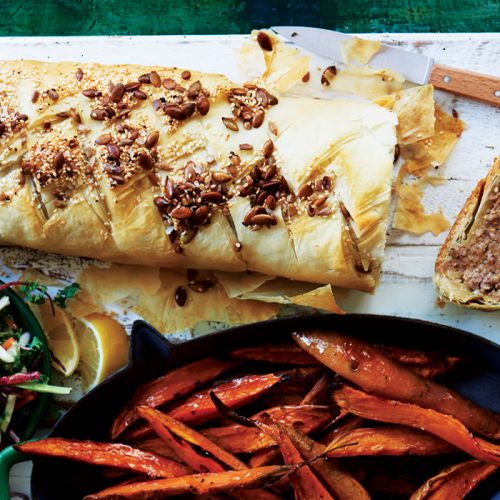
Want the recipe for well-being? Dietitian Brooke Longfield shares the ingredients for a long, healthy and happy life.
Type ‘anti-ageing secrets’ into Google and watch your screen fill with nearly a million links to celebrity diets, superfoods and cosmetic elixirs. Most of them sound too good to be true, and that’s because they are — few of these fountains of youth, if any, have the support of scientific studies.
Needless to say, these quick fixes only scratch the surface of our quest for a long and healthy life.
Meanwhile, a significant body of evidence is steadily shining a light on how to live — and age — successfully.
Interestingly, it all comes down to two factors: our genes, which we can’t change, and our lifestyle choices, which we can. And yes, our health and well-being hinge on one of our most important choices — the foods we eat every day.
Secrets of the Blue Zones
Researchers have gleaned these fascinating insights into ageing from the Blue Zones — five unique geographic and cultural regions in Europe, Asia, Latin America and the US (see map, right.) Why? Because these communities enjoy exceptionally long and healthy lives, with more of them reaching the ripe old age of 100 than people do anywhere else.
These populations also have remarkably low rates of obesity and chronic diseases, most notably diabetes and cancer. Compared with the rest of us, they not only reach advanced ages, but also do so in a much better physical and mental state.
So what do these groups of centenarians know that we don’t? “These populations live longer and better than the rest of us because of what they have in common,” says Dr David Katz, nutritionist and director of the Yale-Griffin Prevention Research Center in the US. “They eat diets of food, not too much, mostly plants; they exercise routinely; they don’t smoke; they sleep enough; they’re not ridiculously stressed out; and their social connections are strong.”
Yes, this is the same advice our own health authorities have been prescribing for years — and the Blue Zones’ inhabitants are living proof of its life-giving power. As Katz puts it: “Feet, forks, fingers, sleep, stress and love are the six cylinders in the engine of lifestyle as medicine, and the Blue Zone residents are firing on them all.”
What people in the Blue Zones have taught us
1. Eat mostly plants
We all know that vegetables are good for us, and the recommendation to eat at least three serves of veges a day is hardly onerous, yet only 64 per cent of us reach that target. Even when you allow for the differences among specific diets in the Blue Zones, all of them deliver a massive 95 per cent of their kilojoules in the form of plant foods. The Okinawan diet is based on stir-fried vegetables, tofu and sweet potato; the people living on the Greek island of Ikaria eat from their vegetable patches; and California’s Loma Linda region is home to a Seventh-Day Adventist community following a Western-style vegetarian diet.
More evidence
Numerous studies link a high intake of vegetables to reduced risks of heart disease, type 2 diabetes and some cancers. In fact, a new European study of nearly half a million people shows that sticking to a mostly plant-based diet can lower your risk of dying from cardiovascular disease by up to 20 per cent.
Live longer tip!
Adding more veges to your diet is easier than you might think. The key is to stop thinking of vegetables as side dishes and to start making them the stars of your daily menu.
To enhance the flavour of your meals, give them a Mediterranean-style makeover. Toss veges in olive oil to reap maximum heart-health rewards, then gently fry or roast them to bring out their natural sweetness.
2. Learn to love legumes
The world’s healthiest people eat plenty of carbohydrates, but not as processed foods. While we’re inclined to overindulge in white bread, biscuits and sugary cereal, they consume lots of fibre and protein-rich carbs and legumes, such as beans and lentils.
Legumes feature prominently in Blue Zone diets, regardless of the region, but particularly in the Nicoya Peninsula, in Costa Rica, where black beans are a staple food.
More evidence
In 2004, a cross-cultural study focused on the diets of elderly populations in four countries — Australia, Indonesia, Sweden and Japan. For every 20g increase in people’s daily legume consumption, their mortality risk dipped by 7 to 8 per cent — so researchers concluded that legumes offer older people more protection against death than any other food group.
So what gives these plant foods their anti-ageing punch? Their low glycaemic index (GI) helps keep blood-sugar levels stable, thereby reducing the risk of diabetes, and their high fibre content protects against bowel cancer.
Live longer tip!
Aim to add half a cup of legumes to your daily menu. Unsure how to cook them? Buy no-added-salt canned varieties, give them a good rinse and toss them into soups, curries and salads. Enjoy legumes between meals as well. Dip vege sticks into hummus.
3. Cut back on meat
Unlike those of us who’ve grown up on meals of meat and two veges, people living in the Blue Zones rarely eat meat. When they do, it’s usually as a side dish and in much smaller portions than the huge steaks you’ll find on some Kiwi menus.
On the islands of Sardinia and Okinawa, meat is reserved for Sundays and other special occasions, and most Adventists swear off meat products.
More evidence
We now know eating too much meat can harm our health — studies show red meat increases the risk of bowel cancer. World Cancer Research Fund guidelines recommend we limit cooked portions of beef, pork and lamb to under 500g per week and avoid processed meats, such as ham, bacon and salami (for more, see Cutting your cancer risk).
Live longer tip!
Keep portions to 100g of raw meat (a piece about the size of your palm), and savour them with vege-packed meals three to four times a week. Steer clear of bacon, salami, sausages and other fatty deli meats. One easy way to eat less meat is to enjoy regular meat-free Mondays. You’ll boost your health and slash your grocery bills!
4. Eat from the sea
It’s no coincidence that all the Blue Zones are either islands or coastal regions. Here, people have easy access to oily fish, such as salmon and sardines, which are rich in omega-3 fats. Studies link these fats to good heart and brain health as well as better mood and a reduced risk of depressive symptoms.
In 2009, a study showed that elderly people living on the Greek island of Ikaria were eating along the lines of a traditional Mediterranean diet, which includes plenty of fish. As a result, senior Ikarians experience very low rates of dementia and depression.
More evidence
Surprisingly, a vegetarian diet with added fish is much more protective against cancer than a vegetarian or vegan diet alone. In a recent US study, vegetarian Seventh Day Adventists who ate fish (pescatarians) were 43 per cent less likely to develop bowel cancer than meat eaters were.
Live longer tip!
Luckily for us, we too are surrounded by water and can enjoy fresh seafood on a regular basis. Aim to add two to three fish dishes to your menu each week, focusing on oily varieties, such as salmon, tuna and sardines. Canned fish counts, too, so keep a few different types on hand for fuss-free midweek meals.
5. Listen to your body
The Japanese approach their meals with the saying hara hachi bu — eat until you are 80 per cent full. This healthy practice involves listening to the body’s hunger cues, which helps them eat less. It’s a cultural habit for kilojoule control which contrasts starkly to the more Western behaviour of clearing our plates (and then going back for seconds).
More evidence
Okinawans tend to stay lean for life and their average body-mass index (BMI) is well below ours. Nearly two in three New Zealand adults are overweight or obese.
Six decades of data on the eating patterns of elderly Okinawans reveal links between a low-kilojoule diet, the lifelong maintenance of a low BMI and an extended lifespan.
Live longer tip!
Learn to tune into your body’s hunger signals. Rate yourself on a scale of zero (empty) to 10 (full), and stop eating when you hit seven or eight. While you’re eating, give the process your full attention so you consciously enjoy every mouthful.
Your stomach takes roughly 20 minutes to feel full, so eating more slowly can help you avoid overindulging. Studies show that eating and drinking from small plates and cups, as Okinawans do, also helps downsize portions.
6. Go nuts for nuts
Wondering what the world’s healthiest people snack on? Nuts! Cracking sources of heart-friendly fats, fibre and antioxidants, nuts feature heavily in the Med-style way of eating on Sardinia and Ikaria, as well as in California’s Adventist community.
More evidence
The world’s largest clinical trial of the Mediterranean diet, the PREDIMED study, shows that people with a high heart disease risk who eat nuts can live longer: Those who ate a 28g handful more than three times a week reduced their mortality risk by 39 per cent. Furthermore, a US study of more than 30,000 Californian Adventists reveals that eating nuts four to five times a week can halve the risk of heart attack.
Live longer tip!
Still, despite nuts’ bags of health benefits, many of us aren’t regularly eating nuts — mainly out of fear of gaining weight. In reality, the opposite holds true.
A number of large studies show that people who eat nuts tend to weigh less than people who don’t.
Let go of the notion that nuts are fatty, high-kilojoule nibbles for pubs and parties. A handful of unsalted high- fibre nuts helps beat hunger, making you less likely to reach for unhealthy snacks.
The Blue Zones are sending us clear messages: Enjoy a wide variety of wholefoods in sensible portions and be flexible. No one food or nutrient is a magic bullet for ageing and disease, so we need to look at the big picture.
“The Blue Zones are as noteworthy for their diversity as for what they share,” explains Dr David Katz.
“In Loma Linda, California, people are vegans. In Costa Rica, their diets include eggs, dairy and meat. In Ikaria and Sardinia, they practise variations on the theme of Mediterranean diets. In Okinawa, Japan, a traditional plant-based, rice-centric diet produces the same outstanding results. In all cases, the theme is the same: real food, not too much, mostly plants.”
Live well to live long
Longevity involves making smart decisions about many aspects of our lives, including which foods we regularly eat. This makes diet a key aspect, but our long-term health and well-being are determined by a multi-faceted approach – and our lifestyles are vastly different from those of people living in the Blue Zones.
While many of us cope with the demands of our stressful, fast-paced schedules, Blue Zone dwellers find pleasure in their steady daily routines. They all live and work with a strong sense of purpose that enables them to share good community support networks, to nurture close relationships with relatives and neighbours and to enjoy meals together as extended families.
Use it or lose it!
Physical activity is simply a part of life for people in the Blue Zones, but again, their approach differs from ours. Many of us sweat it out at the gym for 40 minutes a couple of times a week, whereas most Blue Zone inhabitants move all day long — walking, tending to gardens, practising tai chi and carrying out routine household chores. All of these active tasks help alleviate stress, which experts link to high blood pressure and heart disease.
Three ageing habits to quit today
Are your eating patterns helpful or harmful? Try to avoid making these three mistakes.
1. Eating charred, overdone meat
Barbecuing meat until it blackens creates harmful chemicals, namely heterocyclic amines (HCAs) and advanced-glycation end products (AGEs). Some studies link these toxic compounds to accelerated ageing and an increased risk of some cancers.
2. Overindulging in sweets
Sugary processed foods are also major sources of AGEs, which can damage collagen and elastin, proteins that keep our skin firm and elastic. A high-sugar diet also triggers inflammation in the body, a condition that can fast-track ageing and disease.
3. Drinking alcohol to excess
Enjoying wine in moderation is one thing, but long-term heavy drinking is quite another. This habit can have serious consequences for your health, including your looks. Consuming large amounts of alcohol causes dehydration, which can promote poor skin texture and wrinkles. More important, hitting the bottle can ramp up your risks of high blood pressure, stroke and cancer.
Article sources and references
- American Heart Association Newsroom. 2015. Semi-veggie diet effectively lowers heart disease, stroke risk. American Heart Association Meeting Report Abstract 16 www.newsroom.heart.org/news/ semi-veggie-diet-effectively-lowersheart- disease-stroke-risk?preview=24bd. Accessed June 2015https://newsarchive.heart.org/semi-veggie-diet-effectively-lowers-heart-disease-stroke-risk/
- Australian Institute of Health and Welfare. 2015. Overweight and obesity. www.aihw.gov.au/overweight-andobesity Accessed June 2015https://www.aihw.gov.au/overweight-and-obesityAccessed
- Blue Zones. 2015. www.bluezones.com Accessed June 2015https://www.bluezones.com/
- Cancer Council. 2009. Position Statement — Meat and cancer prevention www.cancer.org.au Accessed June 201https://www.cancer.org.au/
- Consumer Insights Research. Nuts for Life 2012. Research Report: Understanding the attitudes to nut consumption help by health professionals and consumers. Victoria 2012https://www.nutsforlife.com.au/.../Nuts-for-Life-Health-professional-and-consumer-m...
- Danby FW. 2010. Nutrition and aging skin: sugar and glycation. Clinical Dermatology 28:409-11https://www.ncbi.nlm.nih.gov/pubmed/20620757
- Darmadi-Blackberry et al. 2004. Legumes: the most important dietary predictor of survival in older people of different ethnicities. Asia Pacific Journal of Clinical Nutrition 13:217-20https://www.ncbi.nlm.nih.gov/pubmed/15228991
- Ellsworth, et al. 2001. Frequent nut intake and risk of death from coronary heart disease and all causes in postmenopausal women: The Iowa Women’s Health Study. Nutrition Metabolism & Cardiovascular Diseases 11:372-7https://www.ncbi.nlm.nih.gov/pubmed/12055701
- Fraser et al. 1992. A possible protective effect of nut consumption on risk of coronary heart disease. The Adventist Health Study. Archives of Internal Medicine 152:1416-24https://www.ncbi.nlm.nih.gov/pubmed/1627021
- Grains & Legumes Nutrition Council. 2015. Legumes and cancer www.glnc. org.au. Accessed June 2015https://www.glnc.org.au/
- Grains & Legumes Nutrition Council. 2015. Legumes and diabetes. www.glnc.org.au. Accessed June 2015.https://www.glnc.org.au/
- Guasch-Ferré et al. 2013. Frequency of nut consumption and mortality risk in the PREDIMED nutrition intervention trial. BMC Medicine. 11:164https://www.ncbi.nlm.nih.gov/pubmed/23866098
- Health promotion Agency. Alcohol. org.nz. http://alcohol.org.nz/ Accessed October 2015https://www.alcohol.org.nz/
- Hu et al. 1998. Frequent nut consumption and risk of coronary heart disease in women: prospective cohort study. BMJ. 317:1341-5https://www.ncbi.nlm.nih.gov/pubmed/9812929
- Lanou et al. 2011. Reduced cancer risk in vegetarians: an analysis of recent reports. Cancer Management & Research 3:1-8https://www.ncbi.nlm.nih.gov/pmc/articles/PMC3048091/
- Ministry of Health. 2014. Annual Update of Key Results 2013/14: New Zealand Health Survey. Wellington: Ministry of Healthhttps://www.health.govt.nz/nz-health-statistics/national-collections-and-surveys/surveys/new-zealand-health-survey
- Mishra BN. 2009. Secret of eternal youth; teaching from the centenarian hot spits (“Blue Zones”). Indian Journal of Community Medicine 34:273-5http://www.ijcm.org.in/article.asp?issn=0970-0218;year=2009;volume=34;issue=4;spage=273;epage=275;aulast=Mishra
- Orlich et al. Vegetarian dietary patterns and the risk of colorectal cancers. JAMA Internal Medicine 175:767-76https://www.ncbi.nlm.nih.gov/pubmed/25751512
- Panagiotakos et al. 2011. Sociodemographic and lifestyle statistics of oldest old people (>80 years) living in Ikaria island: The Ikaria Study. Cardiology Research & Practice doi:10.4061/2011/679187https://www.hindawi.com/journals/crp/2011/679187/
- Sabaté J. 2003. Nut consumption and body weight. American Journal of Clinical Nutrition 78:S647-50https://www.ncbi.nlm.nih.gov/pubmed/12936960
- Singh et al. 2014 Advanced glycation end products and diabetic complications. Korean Journal of Physiology & Pharmacology 18:1-14https://www.ncbi.nlm.nih.gov/pubmed/24634591
- Willcox et al. 2007. Calorie restriction, the traditional Okinawan diet, and healthy aging: the diet of the world’s longest-lived people and its potential impact on morbidity and life span. Annals of the New York Academy of Sciences 1114:434-55https://www.ncbi.nlm.nih.gov/pubmed/17986602
- World Cancer Research Fund International. 2015. Animal foods. www.wcrf.org/int/research-we-fund/cancer-prevention-recommendations/animal-foods Accessed June 2015.https://www.wcrf.org/int/research-we-fund/
- World Cancer Research Fund. 2011. Colorectal Cancer 2011 Report. www.dietandcancerreport.org Accessed June 2015https://www.wcrf.org/dietandcancer
www.healthyfood.com











